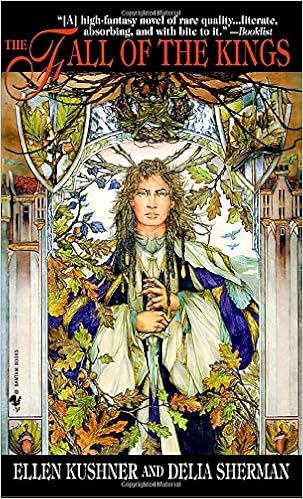"...We know, up in the North, we've always known; about the Sacred Grove and the Deer Hunt and the Royal Sacrifice."Set forty years after The Privilege of the Sword, and about sixty after Swordspoint, this is the story of Theron Campion, posthumous son of the Mad Duke (his parentage is revealed in the short story 'The Death of the Duke), and his love affair with scholar Basil St Cloud, an historian who's interested in the legends of the old kings and their wizards. It's common knowledge that the wizards claimed they were bound by magic to the Land; they chose the kings who would rule; the system was dismantled two centuries ago by the nobles, who saw through the wizards' fraudulent tricks. Even the suggestion that magic might exist is illegal. St Cloud, however, insists on researching primary sources, and what he finds makes him question the consensus.
"The Royal Sacrifice, or the King's Night Out," drawled Fremont into the silence. "It sounds like a bad play." [p. 147]
Meanwhile, the nobles on the Hill are becoming increasingly concerned about rumours of trouble in the North. Can the so-called Companions of the King be anything more than 'an association of young men, young and unmarried, who gather in the woods from time to time to celebrate elaborate rituals that draw equally from local folklore and a youthful taste for mysticism and indiscriminate copulation'? [p. 348] And does Theron's family tree explain their interest in him?
Theron is something of a dilettante, studying at the University until he takes up his duties as Duke Tremontaine: Katherine, the heroine of The Privilege of the Sword, is the current head of the family, and between her benevolent rule and that of Theron's mother Sophia (a surgeon), Theron is allowed to indulge himself. He doesn't reveal his relationship with Basil to his family: Basil, after all, is a commoner, whose father is a tenant farmer on Theron's estates at Highcombe. (Basil can't complain, as he can hardly be open about having an affair with one of his students.) Instead, Theron courts Lady Genevieve Randall, who he thinks might rather like to be Duchess Tremontaine some day.
The Fall of the Kings is much longer, and more richly detailed, than the two preceding books. There are more characters (including more women), and more plot threads: I especially liked the scenes of student life, with claret and eels and arguments about whether the earth revolves around the sun. And I'm especially glad to have read this novel, at last, in its proper place in the sequence, with the weight of backstory behind it. I can see, from Theron's 'outsider' point of view, how Katherine grows up (though I do wonder why she has chosen to remain single) and learn the fate of the Black Rose's child, the utterly splendid Jessica. And it's interesting to see why magic has gone unmentioned in the previous novels -- and how the Tremontaine family have retained their power over the centuries. [I note, too, that the revelations of Tremontaine cast the events of The Fall of the Kings in a different light.]
Now I am more than ready to embarque upon Tremontaine Season 2 ...

No comments:
Post a Comment